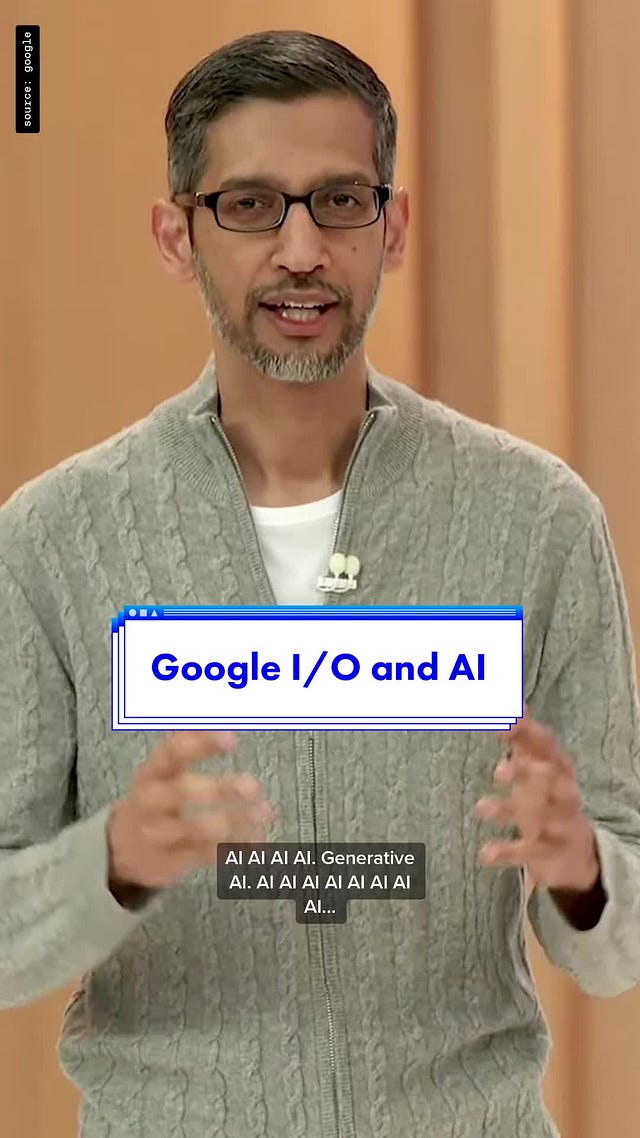Wendy’s AI drive-thru chatbot. Using AI to detect early Parkinson's
and OpenAI threatens gpt4free project for lawsuit
📣 Happy Thursday!
Welcome aboard to another newsletter. This week some amazing stuff came out, check it out!
In Today’s letter:
Wendy’s AI drive-thru chatbot.
Using AI to detect early Parkinson's.
OpenAI threatens the gpt4free project with the lawsuit.
Wendy’s AI drive-thru chatbot.
Hey there! So, Wendy's, a fast-food chain in the US, is planning to test an artificial intelligence (AI)-powered chatbot next month that can speak with customers and take their orders. The chatbot, called "FreshAI," is powered by Google Cloud's AI software and will launch in the Columbus, Ohio area.
“By leveraging generative AI, Wendy’s seeks to take the complexity out of the ordering process so employees can focus on serving up fast, fresh-made, quality food and exceptional service,” the company said.
Why? The idea is to revolutionize the fast-food industry by simplifying the ordering process so employees can focus on making fast, fresh-made, quality food and delivering exceptional service.
This is all thanks to "generative AI" - a fancy way of saying that AI can create new and unique responses to customer queries, making ordering easier and faster.
But… there's a catch. The bot needs to be trained to understand customers' orders. For example, when someone orders a milkshake, they might actually be referring to a Frosty, Wendy's version of an ice-cream beverage.
As of 2022, the bot's accuracy rate was 79%, which isn't bad, but Wendy's hopes to increase it to 85% or higher to compete with other fast-food chains using similar technology.
Now, this isn't entirely new. Last year, McDonald's opened a fully automated restaurant in Fort Worth, Texas, and deployed more AI-operated drive-thrus around the country.
And other fast-food chains, like Sonic and Popeyes, are also experimenting with AI.
Google Cloud’s chief executive, Thomas Kurian, said: “Generative AI is fundamentally changing how people interact with brands, and we anticipate Wendy’s integration of Google Cloud’s generative AI technology will set a new standard for great drive-thru experiences for the quick-service industry.”
But, the introduction of these bots and automation in fast-food restaurants may add to concerns that jobs once done by humans will be taken over by robots.
It's a valid concern, but it's important to remember that human employees will still be monitoring the chatbot and drive-thru to ensure that orders are correct and customers are satisfied.
So, next time you're craving some fast food, don't be surprised if you end up chatting with a robot instead of a human employee. And who knows, maybe one day we'll even have AI that can make the food too - though I'm not sure how I feel about that.
Using AI to detect early Parkinson's
Did you know… that Parkinson’s disease (PD) is the fastest growing neurological disease in the world? But don't worry, there's a new study that might change the way we track Parkinson's using artificial intelligence (AI)!
Normally… PD is only diagnosed years after early signs appear – when movement symptoms like tremors, rigidity, and difficulty walking are present. But this new study found a potential early biomarker for PD using breathing patterns during sleep.
How? The study used AI to develop a system that could identify people who have PD, assess their disease severity, and track their progression over time. And get this, they were able to do it just by analyzing breathing patterns during sleep! That's pretty cool, right?
The idea is that since breathing and sleep are impacted early in the development of PD, this AI model could potentially recognize individuals with PD before their actual diagnosis.
And the best part is, no state-of-the-art equipment is required, and no special training is needed for the person with PD or caregiver.
To test their AI technology, researchers used a large dataset that included data from more than 120,000 hours of nighttime breathing among 757 people with PD and 6,914 control subjects (people without Parkinson’s). And the results were pretty impressive!
The AI system was able to predict the presence or development of PD with 90% accuracy and track PD progression and estimate PD severity.
Plus, the AI system can provide nightly and weekly measurements in a person's home that tests such as the MDS-UPDRS would not be able to capture.
So, what does this mean? Well, with this AI system, people at high risk for PD (like those with the LRKK2 gene mutation) could passively monitor their status and provide feedback to their provider.
Plus, this method is low-cost and would bring accessibility to PD care to people who live in rural areas not near medical centers that specialize in PD care.
Overall… this AI system has the potential to be a game-changer in the world of Parkinson's disease. And who knows, maybe one day we'll be able to diagnose PD just by analyzing a person's breathing!
OpenAI threatens the gpt4free project with a lawsuit
So apparently… the nonprofit-turned-for-profit company OpenAI is chasing down a computer science student over an open-source project called GPT4free.
Basically… this student created a tool that pings websites that use OpenAI's GPT-4, so you can interact with it without paying for OpenAI's ChatGPT Plus service.
But here's the catch - GPT4free doesn't use OpenAI's application programming interface (API) directly, which is what OpenAI charges fees for.
Instead… it reaches out to other services like Microsoft's Bing Chat and Quora's Poe platform to get responses. Sneaky, right?
Now, you might be thinking, "Well, can't you already use GPT-4 for free on those platforms anyways?" And the answer is yes, but those platforms offset the cost with advertisements.
GPT4free cuts out those ads, but the developer points out that these services could easily block external requests if they wanted to.
So why is OpenAI so mad about this? The developer thinks it's because OpenAI is claiming that they're directly attacking them. OpenAI sent the developer a notice to take down the project from GitHub or face a lawsuit.
But the developer isn't backing down just yet. They're making changes to GTP4free and rebranding it to avoid any legal troubles.
But seriously, who knew that creating an open-source project could cause such drama? It's like a real-life episode of "David vs. Goliath." Except in this case, David is a computer science student and Goliath is a giant AI company. Who will come out on top? Only time will tell.
🔥 What’s trending
👉🏻 Meta open-sources multisensory AI model that combines six types of data.
👉🏻 Humane’s new wearable AI demo is wild to watch — and we have many questions.
👉🏻 IBM launches Watsonx, a new generative AI platform.
That’s it for today!
If you liked the newsletter, give it a ❤ and, as always, feel free to share your views in the comment section below 👇🏻
See you next time!





